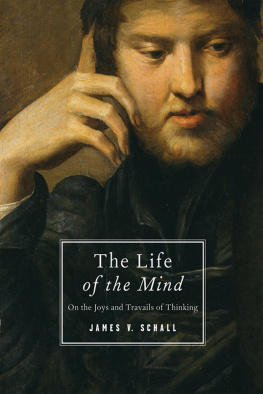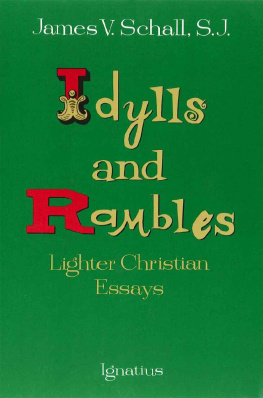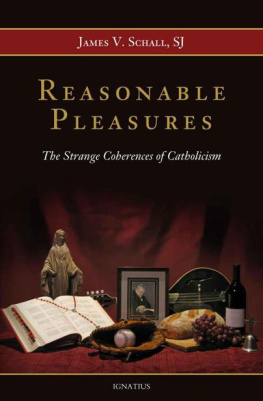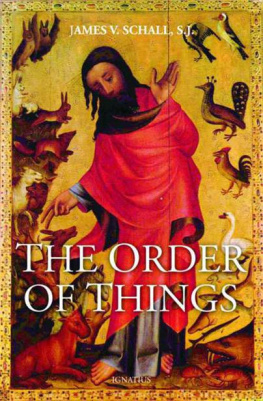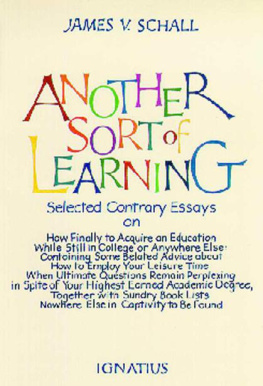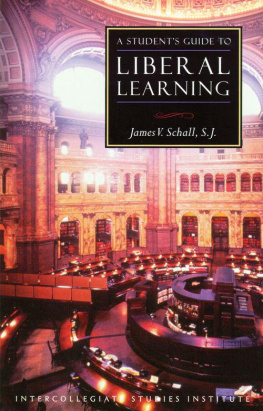Introduction
A C ERTAIN L IGHTNESS IN E XISTENCE
The title, subtitle, and two introductory citations of this book contain four thematic elementsthe life of the mind, the joys and travails of thinking, the splendor of discovery, and the potential existence in ourselves of all things not ourselves. The notion of precisely the splendor of discovery is something that I found in the poet Phyllis McGinley, though it is an ancient idea. It does not merely mean that things exist, or even, as tienne Gilson once said, that things exist and I know them. It includes the additional element that we see a light, as it were, shining through all reality, something that incites us to respond to it, to behold it. There is a radiance to being. All things that are limited to themselves point to what is not themselves.
Although I was at first inclined to title this book The Splendor of Discovery, I finally decided to call it The Life of the Mind, a title I quite liked. But a friend in Australia reminded me that this title, The Life of the Mind, had also been given to a famous two-volume study by the great German philosopher, Hannah Arendt. I had to laugh at this reminder, as I have on my shelves both volumes of this work, devoted respectively to Thinking and Willing. The final volume, Judging, never appeared. Indeed I had reviewed this book.
My life of the mind is not that of Arendt, of course, but she is right. The lie is opposed to the true statement of what is, just as error is opposed to valid reasoning. The life of the mind is indeed concerned with distinguishing lies from truth, error from reason. We want to know these thingswhat is truth? what is error? what is reasonable? what is a lie?for their own sakes, because that activity of knowing these things is our life; it is our mind. In the end, The Life of the Mind, as I hope will become clear, still seems to be the best description of what I have to say here.
This book, be it affirmed in the beginning, lest there be doubt, is not a study about a physical organ called the brain, nor is it a book in logicof how concepts are related to each other. Any bibliographical or research check online or in a library will reveal, besides the Arendt books, numerous other books and papers with this same title, the life of the mind, dealing with sundry aspects of knowing or with the physical organ, the brain.
That our minds are alive, that they have a life, is a classic philosophic principle. Vivere viventibus est esse, that is, the very being of living things is that such things do live. They have a source of motion within themselves, their own peculiar activity. Likewise, some living things, ourselves included, also have minds. The very life of beings with intelligence is to think, to exercise this intelligence actively, on what is. A knowing being lives most acutely, most vividly, when it thinks about what is.
Our minds initially are empty. While empty, even before we think anything, they are minds, that is, knowing powers we did not give ourselves. Until they encounter something not themselves, something outside of themselves, our minds do not know anything. The mind is a power that actively seeks to know what is there, what it encounters. More precisely, what knows is not the mind but we ourselves with or through our minds. Nothing, furthermore, is really complete unless it is also known. All things have two existences, a real one and a mental one. The mental one is really a quality of the existing being who is thinking about what, outside of himself, is known through his mind.
We can, however, know something but not really be moved by it. We can choose not to think deeply about it. Chesterton once said, in a memorable phrase of which I am inordinately fond, that there is no such thing as an uninteresting subject, only uninterested people. Nothing is so unimportant that it is not worth knowing. Everything reveals something. Our minds cannot fully exhaust the reality contained in even the smallest existing thing.
The condition of our being human, then, is the risk of not knowing something worth knowing. The whole universe may dwell in our minds, as Aquinas remarked. This indwelling is the purpose for which we are given minds in the first place. What makes it all right to be a particular, finite human being, such as each of us is, is that, because of intelligence, the universe is also given back to each of us. Our knowing does not take anything away from what is known. Nor does our individual knowing take anything away from others knowing the same thing in the same universe.
What is given to us besides ourselves seems initially given that we might simply behold it. This is what Aristotle meant when he defined the mind as that power that is capable of knowing all things. This primary contemplative moment does not imply that we can have no further purpose or use for what we know. Knowledge enables us to act in the world for our immediate and ultimate purposes. Nonetheless, what is there to be known usually antedates our own finite existence. We know ourselves first as receivers of what is there to be known without us.
This is a book about thinking and reading, about thinking while reading, about being aware and being delighted in the very acts of either reading or thinking. It is, if you will, a book in the famous artes liberales, in the liberal arts. That is, it deals with those things that free us to be what we are, what we are intended to be, beings who know, who know what is, who delight in this knowing. We are not to be afraid of the splendors in things, except perhaps in the fear that, granted our finiteness and, more darkly, our reluctant wills, we may miss some of them.
Some advice will be found here about what to read and why to read. At the end, there is a particular book list designed to waken our minds. If there is a sense of urgency, of not wanting to miss anything, even if, till now, we have missed many things, it is not set over against the leisure in which we have time for things. We want to know things that are beyond ourselves, that are not ourselves, almost as if this knowing others is part of knowing ourselves, as I think it is. We are not given ourselves as if we were only to be concerned with ourselves. Yet, we are receivers; we are given things so that we might know them. We are even told to know ourselves, no mean feat as the history of philosophy and our own experience teaches us.






